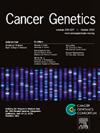ENPP1 promotes immune suppression, drug resistance, and adverse outcomes in bladder cancer: Potential for targeted therapy
IF 2.1
4区 医学
Q4 GENETICS & HEREDITY
引用次数: 0
Abstract
Background
ENPP1 (Ectonucleotide Pyrophosphatase/Phosphodiesterase 1) plays a critical role in multiple cancers; however, its role in bladder cancer (BC) remains largely unexplored. This study investigates the impact of ENPP1 on tumor progression, apoptosis, and the immune microenvironment through bioinformatics and experimental validation.
Materials and methods
ENPP1 expression and clinical significance were analyzed using TCGA-BLCA, GEO datasets, and a local clinical cohort of 36 BC patients. Immune infiltration and functional enrichment were assessed using ESTIMATE, CIBERSORT, and clusterProfiler. Single-cell RNA sequencing (scRNA-seq) data examined ENPP1 expression in BC tissues. Stable ENPP1-overexpressing (UMUC3) and ENPP1-knockdown (J82) cell lines were established. Functional assays, including proliferation, migration, and apoptosis marker analysis, were performed.
Results
RT-qPCR, Western blotting, and immunohistochemistry confirmed differential ENPP1 expression between BC tissues and adjacent normal tissues. High ENPP1 expression was associated with worse overall survival (OS), advanced T and N stages, and poor pathological grades. Functional assays demonstrated that ENPP1 overexpression enhanced proliferation, migration, and apoptosis resistance, while knockdown suppressed these processes. Mechanistically, ENPP1 overexpression reduced pro-apoptotic markers BAX and Caspase-3 while increasing anti-apoptotic Bcl-2. Immune infiltration analysis revealed a positive correlation between ENPP1 expression and M2 macrophage infiltration, alongside decreased CD8+ T cell infiltration. scRNA-seq identified high ENPP1 expression in cancer-associated fibroblasts and epithelial cells. Drug sensitivity analysis linked elevated ENPP1 expression to resistance against chemotherapies like gemcitabine and cytarabine.
Conclusion
ENPP1 drives tumor progression, modulates immune infiltration, and contributes to chemotherapy resistance in BC, underscoring its potential as a therapeutic target.
ENPP1促进膀胱癌的免疫抑制、耐药和不良结局:靶向治疗的潜力
denpp1(外核苷酸焦磷酸酶/磷酸二酯酶1)在多种癌症中起关键作用;然而,其在膀胱癌(BC)中的作用在很大程度上仍未被探索。本研究通过生物信息学和实验验证探讨了ENPP1对肿瘤进展、细胞凋亡和免疫微环境的影响。材料和方法采用TCGA-BLCA、GEO数据集和当地36例BC患者临床队列分析senpp1的表达及其临床意义。使用ESTIMATE、CIBERSORT和clusterProfiler评估免疫浸润和功能富集。单细胞RNA测序(scRNA-seq)数据检测了ENPP1在BC组织中的表达。建立稳定的enpp1过表达(UMUC3)和enpp1敲低(J82)细胞系。功能分析,包括增殖、迁移和凋亡标志物分析。结果rt - qpcr、Western blotting和免疫组化证实ENPP1在BC组织和邻近正常组织中的表达存在差异。ENPP1高表达与较差的总生存期(OS)、晚期T和N分期以及较差的病理分级相关。功能分析表明,ENPP1过表达增强了增殖、迁移和抗凋亡,而敲低则抑制了这些过程。机制上,ENPP1过表达降低促凋亡标志物BAX和Caspase-3,而增加抗凋亡标志物Bcl-2。免疫浸润分析显示ENPP1表达与M2巨噬细胞浸润呈正相关,同时CD8+ T细胞浸润减少。scRNA-seq鉴定出ENPP1在癌症相关成纤维细胞和上皮细胞中的高表达。药物敏感性分析将ENPP1表达升高与对吉西他滨和阿糖胞苷等化疗药物的耐药性联系起来。结论enpp1驱动肿瘤进展,调节免疫浸润,参与BC的化疗耐药,强调其作为治疗靶点的潜力。
本文章由计算机程序翻译,如有差异,请以英文原文为准。
求助全文
约1分钟内获得全文
求助全文
来源期刊

Cancer Genetics
ONCOLOGY-GENETICS & HEREDITY
CiteScore
3.20
自引率
5.30%
发文量
167
审稿时长
27 days
期刊介绍:
The aim of Cancer Genetics is to publish high quality scientific papers on the cellular, genetic and molecular aspects of cancer, including cancer predisposition and clinical diagnostic applications. Specific areas of interest include descriptions of new chromosomal, molecular or epigenetic alterations in benign and malignant diseases; novel laboratory approaches for identification and characterization of chromosomal rearrangements or genomic alterations in cancer cells; correlation of genetic changes with pathology and clinical presentation; and the molecular genetics of cancer predisposition. To reach a basic science and clinical multidisciplinary audience, we welcome original full-length articles, reviews, meeting summaries, brief reports, and letters to the editor.
 求助内容:
求助内容: 应助结果提醒方式:
应助结果提醒方式:


